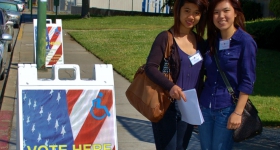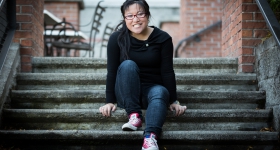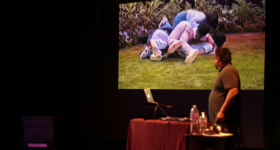I’M STUCK. I’m in my late-20s; I have two degrees from the Asian American Holy Grail of schools (aka Ivy League) and some slightly unconventional, yet still model minority-worthy work experience on my resume. I’m ready to conquer the world. Only the world doesn’t appear to be waiting for me to conquer it.
The economy doesn’t seem that impressed either. And my trade, journalism, is taking a beating along with other industries. Meanwhile, my family fretfully equates my romantic career visions with a lack of ambition. But raised in a follow-your-passion, anything-is-possible ethos, backing out of my dreams for a steadier paycheck would amount to the great American copout. So, what now?
Enter, stage left: a couple of gently butt-kicking life coaches — female, Asian American. Who better to understand my particular brand of struggle and equip me to get unstuck?
Cathy Akiyama, a Sansei from a predominantly white community in Spokane, WA, is one of a small number of Asian American life coaches in the United States. It took years of working with other Asian Americans in previous corporate jobs to recognize some of her own Asian-inspired workplace struggles, like not speaking up out of deference to senior colleagues. “I’m pretty Americanized,” she says. “Only when I got to work with more Japanese people would I start to see these themes that I grew up with. I didn’t realize they were Asian issues — I just thought it was my upbringing.”
Her Asian American clients struggle with similar challenges. “They don’t feel like they can speak up,” she says. “They’re working to death but they’re afraid to say, ‘I’ve got too much.’ ” When she was a manager at a pharmaceutical company, colleagues would be sent to her for the “QBC” — the “Quit Being Chinese” lecture.
According to Akiyama, one of the main keys to leadership in the workplace is gaining trust. Developing trust requires engaging and sharing with people, but she’s observed that Asians can lack communication skills, while being selective about whom they share things with.
Ying Zhang, one of Akiyama’s clients, has also learned this lesson. Now in her 40s, Zhang came to the United States from China at the age of 25. At work, colleagues were mostly white and conservative. She says she kept to herself, thinking: “I’m different. They’re the majority. My story probably has no value.” Akiyama encouraged her not to fear letting people know who she was — people would like her more.
“Awareness around the choices we make is one of the biggest gifts of coaching,” says Julia Lau de Guzman, a first-generation Chinese American coach from Fremont, CA. “It’s like an emotional muscle we develop. It’s emotional weight-lifting, and the coach is the trainer.”
After talking with these coaches, I feel a little buffer. They ask me about my ideal vision, practical considerations aside. That’s easy: I write, I get paid. They probe. Why do I like writing? As I speak, they observe. “Writing is resonant for your values,” Lau de Guzman says. “It allows adventure, moving in different worlds, expression, creativity.” Pretty right on.
So how do I align my values with reality? “What’s the sticking point?” she asks. My self-sabotaging voice is summoned, listing my fears and anxieties. This is when the coach gets to work.
I get counsel ranging from the concrete:
“Don’t see limitations,” Akiyama says. “The people closest to you can be the most dangerous. … Your family and friends want to help, but embedded in their support for you is what they want from you.”
To the metaphysical:
Lau de Guzman assigns me a morning practice of visualization and affirmations: “I invite and allow my life purpose to unfold. I am guided and supported on my path.”
To the practical:
I am encouraged to make the amorphous concrete and take steps to move forward — writing and brainstorming daily. I am held accountable through email.
Could I have reached these resolutions on my own? Eventually, perhaps — but with coaching, as Akiyama says, “you can get through it in a couple of hours instead of wasting two years of your life getting stuck.”
Nichole Y. Wong was previously a fellow at Mother Jones magazine. This is her first piece for Hyphen.









Comments